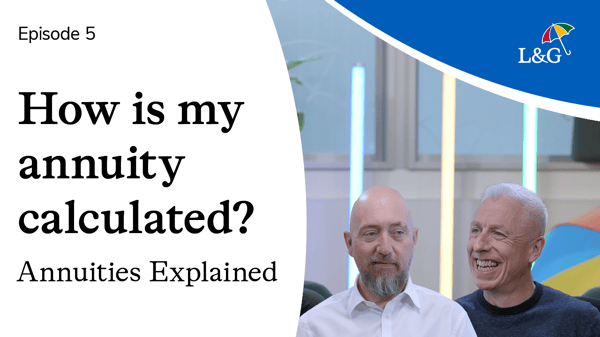How much does an annuity cost; £100k, £300k and £500k pension pots
If you’ve spent years in a permanent job, you can get very used to a regular income. And if you haven’t always been in paid work, the thought of guaranteed payments dropping into your bank account in a nice, predictable way can be very appealing indeed.
That can be one of the advantages of retirement. You can combine the State Pension and your own retirement savings to create a regular guaranteed monthly income for yourself. And buying an annuity is one of the most reliable ways of doing that. But how much does an annuity cost?

07:17
Barry: Hi, John. Great to see you again. I've been thinking. All my life I've been working, and I've been used to getting a salary every month. A fixed amount I know is going to come in that I feel comfortable about. And then I'm going to retire. What's going to happen then?
John: The good thing about an annuity is it can replicate that. Whether you've been receiving a salary or people who haven't, they're kind of familiar with the concept of receiving a regular income. Annuity gives you that, it will pay out the amount of money you expect. It will pay out on the date you expect it, and it will continue to pay the frequency you expect. And that could be monthly. It could be half-yearly. It could be yearly. You decide, because as we've discussed before, the way the annuity is put together is to suit you and your requirements.
Barry: Well that's fantastic because it's a bit like working, getting that income without all the hard work of actually going to work. I like that, that sounds fantastic. Reassuring. That's reassuring to me. Like it would be to a lot of employed people, I suspect. How much does it cost?
John: How much an annuity costs depends on what income you want. So, if you're trying to achieve a certain amount of income that will have a specific cost to it. The minimum you can usually buy an annuity for is £5,000. Okay. But there's no upper limit. So, you can invest as much as you want to purchase that annuity. There are some things that will affect the level of income that you can get though, from that. So if you choose certain features on your annuity it can work by reducing your initial income that you receive.
John: So for example, if you were to include a loved one on your annuity so that it pays money to them after you die, then there is a cost to that. So the income that you receive will reduce slightly. That's the result. It's also worth bearing in mind, Barry, that just like a salary, the income will be taxed as income. Okay. So as you're used to unfortunately paying those taxes, you're still going to have to do that with your retirement income. And all the costs and charges are taken into consideration for the product when you get your annuity rate and when you income, there's no further costs and charges to pay there. One thing to bear in mind, though, is if you do use a financial advisor to help you, there could be charges that they make for the for the advice that they give you.
Barry: Thanks, John. So how do I calculate how much I want to spend on my annuity?
John: A good place to start would be L&G's annuity calculator. That can give you a good idea about the income that you can achieve for varying amounts of investment. There are also other calculators that you can use from providers. And even the Money and Pension Service have their calculators as well that you can use.
Barry: Okay, John. So can we work through an example. Is that all right?
John: Yeah, of course. Let's say I'm 65, I remain in perfect health. I don't want to add any options, any loved ones, anything like that to it. And I've built up a pension pot of, just say for argument's sake, a nice round figure of £100,000.
Barry: What does that get me? What do I buy for that?
John: Well, the first thing you'll get is 25% of it as a tax-free lump sum. So a quarter of your money, £25,000 you'll get tax-free from the off. Yeah, it's a good perk. And then with the remainder of the money, you would buy your income. Based on those figures, you're probably looking at about £4,700 a year as an income.
Barry: That's really helpful. But what if I built up a bigger pot of money, what if I had say for instance, £500,000 pounds?
John: Well congratulations on saving that much, Barry, you've done well. The good news is your tax-free sum increases quite a bit. So you're now up to £125,000 pounds as tax-free cash that you can take from that. And then the income that you could achieve from purchasing that annuity with the rest of it is £23,400 a year.
Barry: Right, so starting to get interesting. I'm starting to get more tax-free cash, which sounds really appealing as well. Not that I want to necessarily work for longer, but let's just say I hold off a bit and I decide to not take my annuity until a little bit later in life. Will that make a big difference?
John: Yes it does. So your annuity rate that we've discussed previously, one of the things it looks at is how long your life expectancy is. So as you get older, obviously that shortens. So you can look to get a higher income as a result. So your annuity rate will increase and the amount of income that you get will increase. So it's worth remembering, apart from the tax-free cash amounts I've said that all the income is going to be liable to income tax when you receive it.
Barry: Okay. So you still get the tax in the end?
John: They do, yes. But you still get that chunk that's tax-free.
Barry: Right, okay. Really helpful. So we've looked at these almost mythical amounts, 100,000 500,000. But when I get to retirement with my specific figure, how do I work out what's good for me?
John: The Retirement Living Standards website might be a really good place to start, Barry. It allows you to set out some of the things that you want to achieve in your retirement. Be that holidays, cars, you know, general, looking after yourself and it'll help you come up with a total sum and show you how on track you are for meeting that. It's a really, really useful website. I recommend you use that one.
Barry: Really practical. I really like this. I'm starting to think about figures, amounts and more importantly, over all of this is what I might actually want and what I might actually need, and what I want my retirement to look like and then see how I can fund it. John, you've been magnificent again, thanks very much.
John: Oh, you're really welcome, Barry. Thank you. To find out how much you can get in your retirement, try our annuity calculator. And also if you liked the video, remember to like, share and subscribe.
Well, there’s no simple answer to that. You have to use your pension savings to buy one, but the amount people have to spend can vary hugely.
The least you can spend on one is usually £5,000. There’s no annuity cost upper limit. And if you do buy one, you don’t have to put your whole pension pot into it.
Choosing different features when you buy an annuity will also have an impact on the regular income it provides. You might want your income to increase or to make sure that it goes to a loved one when you pass on. All that and more is entirely possible, but these options will affect the amount of income the annuity gives you. Other factors like your age, health, lifestyle and even your postcode will also make a difference.
So one answer to: “How much is an annuity?” is: “Well, what are your circumstances and how much do you want to spend on one?” But that’s not very helpful. So we’re going to give you some annuity-buying examples and show you how to explore annuity costs in more detail.
How have we created our annuity cost examples?
We’ve used our own annuity calculator to see how much different annuity spends could get you if you:
- Buy your annuity when you’re 65.
- Want a guaranteed income paid monthly for the rest of your life.
- Want a Guaranteed Minimum Payment Period for 10 years.
- Don’t go for any extra product options or benefits.
- Are in perfect health.
All our income quotes are before tax and are based on the annuity rates in June 2025. They’re really just a starting point, to give you a general idea of how much annuities cost and the income you could receive.
Here is an idea of the pre-tax annuity income you could receive from three different pension pot sizes if you bought an annuity at age 65:
| Pension pot size | £100,000 | £300,000 | £500,000 |
| Tax-free cash | £25,000 | £75,000 | £125,000 |
| Pension annuity | £5,265 each year for the rest of your life | £15,615 each year for the rest of your life | £26,250 each year for the rest of your life |
Annuity rates correct as at 12 June 2025.
You can use our annuity calculator yourself to see how other choices might work for you and when you plan to retire. For example, buying an annuity at the age of 75 might give you one and a half times more monthly income than buying it at 55. The exact amount you’ll get will depend on your provider, your circumstances, any product options you choose, your postcode and how annuity rates are doing when you buy your annuity.
When you take out a pension annuity, any costs and charges are taken into account when the annuity rate is set. This may not be the case for all providers though, and you should check before you make any final decisions. If you speak to a financial adviser, they'll probably charge you for their advice so you should factor that into your annuity costs.
What annuity income will a £500,000 pension pot buy?
If you’re retiring at 65 with £500,000 in your pension pot, you could spend all of it on an annuity. But that might not be the best use of your pot. That’s because you’d miss out on taking the first 25% of it as tax-free cash. So you might want to:
- Take £125,000 tax-free.
- Put £375,000 into your annuity.
If you did that, you’d get a pre-tax income of around £26,250 a year for the rest of your life.
So there’s really no simple answer to questions like: “How much annuity income does 500k buy?”. That’s defined by your needs and choices as much as by the size of your pension pot. And the exact amount it pays out will depend on the details we’ve listed in our “How have we created our annuity cost examples?” section above.
What annuity income will a £400,000 pension pot buy?
If you’ve got £400,000 in your pension pot, you could take £100,000 of it as tax-free cash. Then you could spend £300,000 on an annuity, giving you around £21,000 a year before tax for the rest of your life.
How much can I get from an annuity with a £300,000 pension pot?
If you’ve got £300,000 in your pension pot, you could take £75,000 of it as tax-free cash. Then you could spend £225,000 on an annuity, giving you a pre-tax income of about £15,615 a year for the rest of your life.
How much annuity income does £100k buy?
A £100,000 annuity will give you a guaranteed income of around £5,265 a year, before tax, for the rest of your life, after you’ve taken your tax-free cash of £25,000. It might be that you’re looking for more money over a shorter period of time though. In that case, the best way of exploring the different amounts a £100,000 annuity could pay you every month is to visit our annuity calculator. It’ll help you compare different types of annuity and see how buying a £100k annuity at different ages could affect the amount you’ll get.
How much annuity income does £50k buy?
If you’ve got £50,000 in your pension pot, you could take £12,500 of it as tax-free cash. Then you could spend £37,500 on an annuity, giving you a pre-tax income of about £2,540 a year for the rest of your life.
How much annuity income can you get for £30,000?
If you have a pension pot size of £30,000, you could take £7,500 of it as tax-free cash. This would leave you with £22,500 to spend on an annuity, giving you a guaranteed pre-tax income of around £1,480 a year for the rest of your life.
So there’s no simple answer to questions like: “How much annuity income for £30,000?”. UK people planning for retirement should know that the exact amount will depend on:
- How much you put into it.
- Your age and circumstances when you buy it.
- The type of annuity product you choose.
- Any product options or benefits you go for.
Our annuity calculator will show you what you could get and help you explore some of your options. It’ll help you move from thinking about a hypothetical annuity cost to getting actual quotes. More generally, we recommend shopping around to understand all your choices and get to know the broader annuity market.

What annuity could a smaller pension pot buy?
Your pension pot needs to have at least £5,000 in it, after you’ve taken your tax-free cash. So if you have a pension pot size of £7,000 (the minimum amount you'll need to play around with our Annuity Calculator) you could take £1,750 of it as tax-free cash. This would leave you with £5,250 to spend on an annuity, giving you a guaranteed pre-tax income of around £270 a year for the rest of your life.
When you’re thinking about your retirement income, the State Pension can make a big difference to your budgeting plans. At the moment you can start getting it when you turn 66, though that’ll go up to 67 between 2026 and 2028, and eventually it will go up to 68. Your payments will reach you every four weeks.
In 2025/26, the full payment’s £230.25 a week. To get that, you’ll need to have paid National Insurance for at least 35 years. If you’ve paid it for less than that, you’ll get less. You can see what you’re in line for at the Government’s Check your State Pension forecast page.
What should I do next?
It’s also very important to have a clear sense of how much income you’ll need. The Retirement Living Standards site will help you think through what sort of retirement lifestyle you’d like and see how much you’ll need to save to pay for it.
And make sure you understand all your retirement income choices. For example, you could opt for drawdown. It lets you take money out of your pension pot when you need it, leaving the rest still invested. But your money might run out at some point. Check out our Annuity vs Drawdown article for a comparison between the two.
If you’re not sure what’s best for you, there are many sources of advice out there. We’ve already mentioned some good starting points:
- The Government’s Pension Wise website, for free and impartial pension guidance for over 50s.
- Unbiased, where you can find a paid financial adviser.
- For over 55s, we have our own Retirement Advice Service.
Related articles

What are the latest annuity rates?

Annuity vs drawdown – what's the difference?


